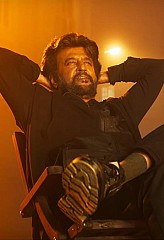
With Telugu star Sri Reddy's accusations stirring up controversy, it has thrown the spotlight on a major issue: Casting Couch.
For beginners, casting couch, or as it is fondly called - ‘compromise round’, refers to demanding sexual favours from actors in promise for a role in films. This is an issue that has been associated with the Indian film industry for a very long time. Actors (both male and female), have started voicing against this, which is a good sign. But, the issue is bigger than what it actually looks like.
When we look at the problem, it seems as if everything is consensual. The actor agreed to sleep with the concerned person and hence he or she cannot complain. This is the argument that most people raise whenever someone opens up about casting couch. This is only the tip of the iceberg. Before we dive deeper into the topic, we must understand the concept of ‘Unequal Power Relationships’. We can understand this better with the help of films like Kaatru Veliyidai and Iraivi.
Kaatru Veliyidai focusses on the relationship between VC (Karthi) and Leela (Aditi Rao Hydari). Even though the relationship between them is consensual, the character VC dominates Leela throughout the film. He tells Leela what she should do, and what she shouldn’t. He goes to war and is not sure if he would return or not. Yet, he instructs Leela to wait for his return. They decide to get married but he doesn’t turn up for the wedding. He humiliates her in public, yet she gets back to him again and again. Why? Because she is in love with him and finds it difficult to leave him. No one can explain that, except Leela herself. Yet, this is an unequal relationship. The power resides with VC and he dictates the terms in this relationship.
Iraivi shows us 2 relationships: One between Arul (S.J. Suryah) and Yazhini (Kamalinee Mukherjee), and the other between Michael (Vijay Sethupathi) and Ponni (Anjali). In both these relationships, the men’s actions make life difficult for their other halves. Once they feel remorseful for their actions, and apologize, they unite with their partners. They repeat these mistakes without a thought about how it impacts their wives’ lives. This is also an example of an unequal relationship. The women have to accept to what their husbands do.
Now, let us superimpose these situations. In both the films, the relationships are not equal because one party has the upper hand. There is inequality which tilts the balance in one’s favour, always. Agreeing to 'whatever' the dominating person says, does not count as consent in an unequal power relationship. Getting into the industry by providing sexual favours to certain people is not consensual because of the simple fact that even here one party holds the upper hand in the relationship. The person applying for a role is dominated. They don’t offer favours because they want to. It looks like favours are the only way to enter the industry. So, the question that must rise is – ‘why should actors offer sexual favours in order to get into the industry?' and not ‘why do actors talk against about casting couch when things are consensual?’
The victims cannot be blamed for this. The only mistake they probably did was to dream about getting into the film industry. Casting couch is the elephant in the room and it must be addressed. The ones asking for sexual favours do so because they have power and thought that the incidents will be brushed under the carpet. Talking about this in the open, might spoil one’s career. They might not get films at all. But, doing so is for the greater good as other deserving actors might get a chance to get in without any ‘compromise.’
Behindwoods is not responsible for the views of columnists.
OTHER LATEST BEHINDWOODS COLUMNS
GURUMURTHY'S OTHER COLUMNS
- How selfish is Shilpa in Super Deluxe? - Spoilers ahead
- How does Karthik Subbaraj create a twist?
- Karuppi and the curse of caste - Must read!!!
- What killed Aravind Swami in CCV? Not Arun Vijay!
- Thyagu was not the right person to succeed Senapathy!
- Vijay Sethupathi and the art of manipulation - CCV
- Reason why Ethiraj died in CCV!
- Rahman wanted to do this for the past 50 years!
- "Ilayaraja has all the rights to slap me!"
- Why I hate 96 Movie!
- Viral Hit! Will this be the Song of the Year? Reasons here!
- Yaaru pa Karunanidhi?
- Dhanush REEL vs REAL life connect!
- Is Suriya saying 'NO' to 'S-U-P-E-R-S-T-A-R'?
RELATED LINKS
- Iraivi-Race Zindagi Ki (The race of life) | Awesome titles of Hindi dubbed Tamil films - Slideshow
- 'அவன் கூப்டா,உனக்கு எங்க போச்சு புத்தி?...மீண்டும்,மீண்டும் 'பெண்களை குற்றவாளியாக்கும் கேள்வி
- RJ Balaji from Kaatru Veliyidai (Dr. Ilyaas Hussain) | List of Morattu Single characters in Tamil Cinema - Slideshow
- #Metoo & Casting Couch in Tamil Cinema - Vijayalakshmi Opens Up | GND 08
- "Sex வெறியன் அவன்" நடிகை Gayatri-ன் வாக்குமூலம் | பின்னால் இருப்பது யார்? | EN19
- Raghava Lawrence Open Challenge to Sri Reddy!
- Sri Reddy Controversy: Karthi Opens Up
- Girls-aala Ithellam Panna Mudeyuma? | Chennai Boys Challenges
- Kaatru Veliyidai - 4 Awards | Which film won the most awards at BGM 2018 - Slideshow
- Best Singer Female - Shashaa Tirupati for Vaan Varuvan | List of winners for BGM 2018 - Slideshow
- Best Music Director - AR Rahman for Kaatru Veliyidai and Mersal | List of winners for BGM 2018 - Slideshow
- Sri Reddy | List of contestants for Bigg Boss Season 2 Telugu - Speculated - Slideshow
- Sri Reddy- Photos
- Anjali as "Ponni" in Iraivi (2016) | 10 memorable roles played by Women in Tamil cinema - Slideshow
- "Casting Couch provides a Livelihood" : Saroj Khan





